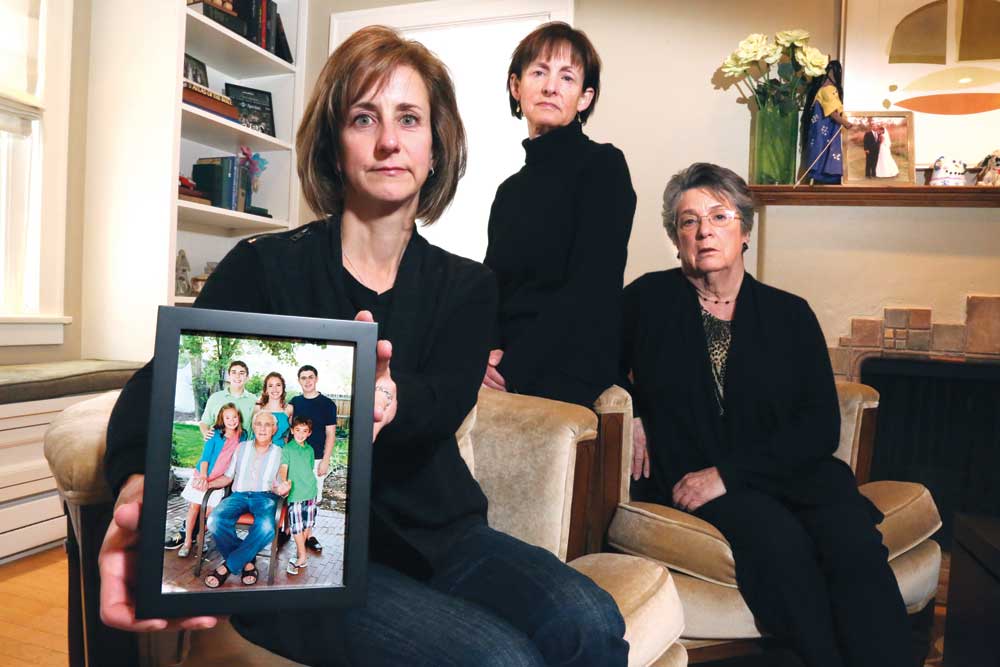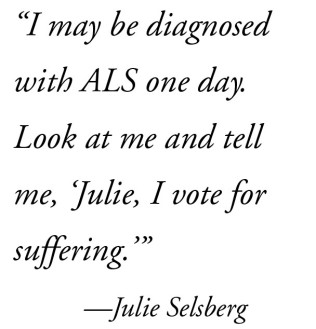I have to give my testimony to you now, because by next week I hope to be dead.

Julie Selsberg holds a photo of her father Charles Selsberg surrounded by his grandchildren. Julie, her sister Elaine Selsberg, and her dad’s long time partner, Bebe Epstein, are carrying out Charles Selsberg’s wishes by supporting a proposed law that would allow terminally ill patients in Colorado to choose when to end their own life.
On February 28, 2014 Charles Selsberg wrote this statement in a letter to the editor of the Denver Post. The letter propelled his daughter, Julie Selsberg of Park Hill, into a public conversation about giving terminally ill patients in Colorado the right to choose when and how they die.
At age 77, Charles Selsberg was diagnosed with amyotrophic lateral sclerosis (ALS), and the disease progressed quickly.
I was a healthy man my whole life… I never thought I would be this person, really just this mind now, trapped in a dead body…I asked my pulmonologist at National Jewish whether his ALS patients waited to die a natural death. He said nearly none of them did…Legislators, you have shown mercy on patients in pain before. Take the next step: Show mercy on the terminally ill.
Selsberg decided to stop taking any nutrition, which he felt was the only way he could take control and end his suffering at the time of his choosing. It took 13 days for him to die.
State Representative Lois Court saw the letter and contacted Julie. Court researched legislation in other states and proposed a bill this session that she called “Death with Dignity” modeled on a law that has existed in Oregon for 16 years. A scientific poll conducted by Talmy-Drake in the fall of 2014 showed that 68 percent of Coloradans supported such a bill.
The bill listed multiple requirements to qualify for the program: You must be an adult, you must have your mental faculties, you must have a terminal diagnosis confirmed by a second doctor, you must have two oral requests separated by two weeks, you must have a written request not witnessed by an heir or caregiver, you must be advised of all other options, you can change your mind at any time, you have to be able to self-administer. Any one that plays with any of these requests in any way can be convicted of a felony. No doctor or pharmacist is required to participate.
The legislative committee held a hearing that lasted 11 hours. One hundred people spoke. “Testimony was split about half and half,” says Court. “It was doctors, lawyers, hospice, disabled, ministers. It was every kind of person on both sides.”
Julie testified at the hearing, telling the legislators, “You are not making the choice to kill them; you are making the choice to give them control over their deaths. Do not shift the responsibility….Hospice and palliative care work for most people—it worked for my mom—but it does not work for everyone. I may be diagnosed with ALS one day. Look at me and tell me, ‘Julie, I vote for suffering.’”
 Court says some of the testimony reflected concern that the bill discriminates against people like ALS or Alzheimers patients. Because the bill requires that the prescription be self-administered, people with ALS or Alzheimers might not be able to take advantage of the law. “If an ALS victim said, ‘I want this,’ and went through the whole process and got the medicine and put it away, by the time they would think they’re ready for it they couldn’t self-administer, or they wouldn’t be mentally competent so they would no longer be eligible under the Colorado bill.”
Court says some of the testimony reflected concern that the bill discriminates against people like ALS or Alzheimers patients. Because the bill requires that the prescription be self-administered, people with ALS or Alzheimers might not be able to take advantage of the law. “If an ALS victim said, ‘I want this,’ and went through the whole process and got the medicine and put it away, by the time they would think they’re ready for it they couldn’t self-administer, or they wouldn’t be mentally competent so they would no longer be eligible under the Colorado bill.”
But even with all the safeguards built into the law, it raised fears in the disabled community.
“A lot of articulate well-spoken people from the disabled community came in,” Julie explained. “They said, ‘Insurance companies will readily hand me the sign-off and say we’ll pay for your lethal dose of this medicine, while simultaneously denying whatever medicine or equipment I might need that will help me go through life with my disability.’”
“Nothing of this nature has happened in the 16 years it’s been in place in Oregon,” says Court. “You can’t create rational law in relationship to fear. It’s very real but I don’t know how we can address it.”
Doctors Bill Bolthouse and Charles Hamlin both testified at the hearing, expressing opposing views.
Bolthouse is a family doctor at the Inner City Health Center that serves those who are poor and uninsured. He says, “I was deeply moved by the stories of the people who are dying. What I want to extend to them (those who are dying who spoke at the hearing) is all we have in medicine to help them through this very difficult time in terms of hospice and palliative care. There are very good reasons we shouldn’t have physician assisted suicide in Colorado. I think it’s bad for doctors. It’s bad for patients. And it’s bad for our society.
“The one asset that I have besides my medical education is the trust that I have with my patients. When you introduce the possibility that I would write a life ending prescription for my patient, that begins to erode that trust.”
Bolthouse thinks a bill like the one Court proposed would set a dangerous precedent. “I see elderly patients in my practice that are subject to elder abuse. How much overt or even covert pressure will there be on the elderly to say you’ve lived long enough? How long will it take until we expand the definition of terminal illness to Alzheimers?”
Hamlin, a retired hand surgeon, is President of the Colorado board of Compassion and Choices. He was deeply influenced by his parents’ deaths, which he says would have been far more compassionate under such a law.
He does not believe abuses will happen due to the many hurdles to get into the program. He says, “In the 16 years of data in Oregon, no one has been taken advantage of by this system.”
Hamlin cites data from Oregon: 1400 prescriptions have been written. Only 753 actually took them, because once people who are dying feel in charge of a peaceful death, they are comforted by it and they almost don’t need it. They have autonomy. Questionnaires show they deal better with their disease and their pain. Their doctors report they are communicating better with their patients who have come to grips with this. Families have less guilt and depression before and after the death when they’ve had the conversation. And the dying have autonomy and feel in charge of their lives at the end.
“I think compassion in medicine is the understanding of suffering and the desire to do something about it, and that includes recognizing the transition, not from life to death, but from dying to death,” says Hamlin. “I’m talking about people who are dying and they want a peaceful end. How do you want to die and how do you want to be remembered by your family? It’s not in the ICU. It’s not lying in bed with diapers on being unable to eat and speak like my mother.”
Hamlin points out that 20-22% of the public has advance directives (the legal document that specifies what happens if a person can no longer make decisions for themselves), but over 60% of doctors have them. “We know what’s out there and we don’t want to go there.”
Bolthouse doesn’t trust the Oregon data. He says, “It’s completely up to the doctor to report the diagnosis, the medication they chose, when the person took it, how their death occurred, and whether the patient had an adequate psychiatric evaluation or didn’t need one. All of that is completely up to one person—the attending physician. If that doctor doesn’t report an abuse, well then there’s no abuse.”
Bolthouse also opposes the bill because he believes it’s bad for our society. “We are judged as a society by how we treat the weakness among us. This bill is very dangerous to those who are the most fragile—the poor, those that have limited or no insurance, the disabled, the elderly. The people on the fringes. ”


0 Comments